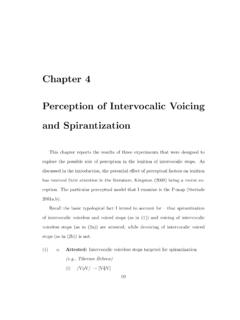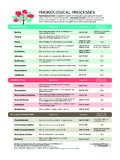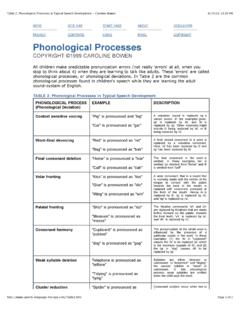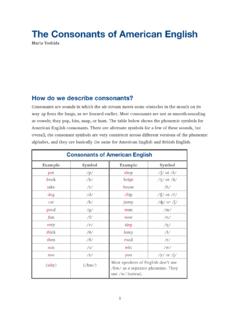Transcription of Russian voicing assimilation, final devoicing, and the ...
1 Russian voicing assimilation , final devoicing , and the problem of [v](or, The mouse that squeaked)*Jaye Padgett - University of California, Santa Cruz"..the Standard Russian an obviously intermediate position between the obstruents and the sonorants." Jakobson (1978)1. IntroductionLike the mouse that roared, the Russian consonant [v] has a status in phonology out of proportionto its size. Besides leaving a trail of special descriptive comments, this segment has played a keyrole in discussions about abstractness in phonology, about the manner in which long-distancespreading occurs, and about the the larger organization of phonology. This is largely because ofthe odd behavior of [v] with respect to final devoicing and voicing assimilation in obstruents devoice word-finally, as in kniga 'book (nom. sg.) vs. knik (gen. pl.), andassimilate to the voicing of a following obstruent, gorodok 'town (nom. sg.)' vs. gorotka ( ). The role of [v] in this scenario is puzzling: like an obstruent, it devoices word-finally, krovi'blood (gen.)
2 Sg.)' vs. krofj (nom. sg.), and undergoes voicing assimilation , lavok 'bench (gen. pl.)'vs. lafka (nom. sg.). But like a sonorant, it does not trigger voicing assimilation : compare dverj'door' and tverj 'Tver' (a town). As we will see, [v] behaves unusually in other ways as is Russian [v] special in this way? The best-known answer to this question posits that[v] is underlyingly /w/ and therefore behaves as a sonorant with respect to voicing assimilation (Lightner 1965, Daniels 1972, Coats and Harshenin 1971, Hayes 1984, Kiparsky 1985). Crucialto this account is the claim that all sonorants in fact undergo assimilation and final devoicing . Arelatively late rule obstruentizes [w], accounting for its surface obstruency. This is a classicexample of derivational opacity, and one that has not been adequately addressed in the frameworkof Optimality Theory. In spite of the great elegance of the derivational account, I will argue for adifferent view: Russian [v] is in fact more sonorous at the surface than any other Russianobstruent though it is not a glide and all of its unusual properties can be plausibly explained byconsidering in greater detail the phonetic properties of such a sound.
3 Independent evidence forthese claims comes from phonetic studies of [v] and from typological considerations. It followsthat no serial ordering of rules or processes is required in order to explain the behavior of thissound; there is no need to call on any intermediate representation at which [v] is [w] or anythingelse. The account therefore bears on the general question of whether this sort of derivationalityand abstractness are necessary to phonology. The second implication of this paper concerns the theory of contrastiveness in phonology:the account here rests on an assumption that phonology can call on featural distinctions that arerarely or never contrastive, and in doing this follows a growing body of work, including Browmanand Goldstein (1986) et seq., Steriade (1994), Steriade (2000), Kirchner (1997), Kirchner (2001),Flemming (1995b), Flemming (2001), Boersma (1997), Zhang (2000), and N Chios in andPadgett (2001), and references therein. An important implication of these works is that potentialcontrasts must be determined not by the inventory of phonological features, but by article is also of interest for its account of voicing assimilation and final , I attempt to clarify the relevant facts, which have not been consistently reported.
4 I then offeran account calling on positional faithfulness (Selkirk 1994, Beckman 1997, 1998), but in whichthe privileged positions are cue-based, following especially Steriade (1997). It turns out that thecue-based approach is crucial to understanding the special behavior of [v].2. The facts BasicsThe basic facts of Russian voicing assimilation have been well described (Avanesov 1956,Jakobson 1956, Halle 1959, among many others). The best known treatments of them in therecent generative tradition are Hayes (1984) and Kiparsky (1985). Obstruents devoice word-finally, as shown (1)sled-aslet'track ( )'knig-aknik'book ( )'raz-aras'occasion ( )'gub-agup'lip ( )'plja -apljaw'beach ( )''In addition, obstruent clusters within a word invariably agree in voicing , with the rightmostobstruent determining the voicing status of the cluster, as shown in (2). The examples in (2)a-cshow prefixes ending in underlyingly voiceless obstruents, while (2)d-f show prefixes withunderlyingly voiced consonants.
5 The underlying status of the consonants is clear from theirbehavior before sonorants ((2)a and d). Tautomorphemic obstruent clusters invariably agree invoicing as well, though this is not shown.(2) 'to ride off's-jexatj'to ride down' 'to step back's-prositj'to ask' 'to throw aside'z-delatj'to do' 'to bring (to)'iz-lagatj'to state; set forth' 'to sign'is-kljutwatj'to exclude; dismiss' etw'to set fire to'iz-gnatj'to drive out' final - devoicing 'feeds' voicing assimilation ; that is, all obstruents of a word- final cluster aredevoiced:(3)pojezd-apojest 'train ( )'vizg-avisk'squeal ( )'izb-aisp'hut ( )'In the next two sections I establish more precisely the conditions under which voicingassimilation and final devoicing apply. Accounts of Russian voicing differ significantly. The areasof disagreement or unclarity fall mostly into two categories: the behavior of voicing assimilation3across word boundaries, and the behavior of sonorants. It turns out one can rather clearlydistinguish facts that are both obligatory and categorical from others that are optional andgradient.
6 My goal will be to account for only the former, since the latter are better handled bymodels of phonetic implementation. (In taking this position on gradient effects I follow Libermanand Pierrehumbert 1984, Keating 1988, Cohn 1990, Zsiga 1993, and many others.) Some of theseconclusions will turn out to affect significantly our approach to [v]. The prosodic domain of voicing effectsFinal devoicing occurs at the end of a phonological word (Pwd). Following Gvozdev (1949),Jakobson (1956), Halle (1959), Vinogradov (1960), and many others, I assume that one or moreprepositions plus the following major category item constitutes a phonological These(uncontroversial) assumptions account for the lack of final devoicing in prepositions. Compare(4)a and (4)b: word- final voiced obstruents devoice before a following sonorant, unless the wordis a preposition. Bracketing indicates Pwd boundaries.(4)a. /otkaz lenY/[otkas] [lenY]'Lena's refusal' /sad mixaila/[sat] [mixaila]'Mikhail's garden'/grob rozY/[grop] [rozY]'Rosa's grave'b.
7 /iz leningrada/[iz leningrada]'from Leningrad'/pod moskvoj/[pod moskvoj]'near Moscow'/nad rozoj/[nad rozoj]'above the rosebush' voicing assimilation occurs within the Pwd, as shown below. The forms in (5)a and (5)d show thepreposition- final consonant before sonorants, making clear its underlying voicing .(5)a. [ot mamY]'from mama'[s mamoj]'with mama'b. [ot papY]'from papa'[s papoj]'with papa'c. [od babuwki]'from grandma'[z babuwkoj]'with grandma'd. [pod mamoj]'under mama'[iz mamY]'out of mama'e. [pot papoj]'under papa'[is papY]'out of papa'f. [pod babuwkoj]'under grandma'[iz babuwki]'out of grandma'The examples in (6) involve enclitics instead of (the prepositional) proclitics. Notice, first, thatfinal devoicing applies before these enclitics: /sad/ in (6)a surfaces as [sat] before the interrogativeparticle [li]. This shows that enclitics are not incorporated into the Pwd (Halle 1959). On theother hand, voicing assimilation applies across enclitic boundaries, as shown in (6) (6) /sok//sad/ a.
8 [sok] [li]'juice (interr.)'[sat] [li]'garden (interr.)'b. [sog] [ e]'juice (emph.)'[sad] [ e]'garden (emph.)'c. [sok] [to]'juice (topic.)'[sat] [to]'garden (topic.)'cf.[sok-a]'juice (gen. sg.)'[sad-a]'garden (gen. sg.)'All sources agree on the final devoicing facts described and on the existence of voicingassimilation within the Pwd (that is, involving prepositions). A recent phonetic study by Burtonand Robblee (1997) confirms the latter. Nearly all sources describe voicing assimilation across theenclitic boundary as well, as shown in (6) Things are less clear regarding voicing assimilationacross major category Here many sources either explicitly deny it ever occurs (Isacenko1947), though this is incorrect, or state that it occurs optionally and/or gradiently (Isacenko 1955,Halle 1959, Baranovskaia 1968, Shapiro 1993).6 Avanesov (1972), a work notable for its degreeof phonetic detail, does not mention assimilation across major category word boundaries at all.
9 Intext he transcribes, assimilation is never indicated in this context, , [stekaet] [dowj:] 'rain flowsdown', [pesok] [gorjutwij] 'inflammable sand', while assimilation is always transcribed within aPwd, , [od znoju] 'from (the) intense heat', from /ot znoju/, [pot svodom] 'under (the) arch',from /pod svodom/. (All examples ) On the other hand, phonetic studies by Paufoshima andAgaronov (1971) and Wells (1987) find assimilation across such boundaries in most here, though, the results are not uniform, with failure to assimilate, and partial assimilation ,occasionally occurring. A conservative position, therefore, would be to posit as the domain ofphonological voicing assimilation a prosodic unit that includes enclitics but is smaller than thephonological phrase. This domain, which I will call a clitic group (CG), encompasses a Pwd andadditional enclitics, , {[sat]Pwd[li]Pwd}CG 'garden (interr.)', from /sad li/, {[is kard]Pwd [ e]Pwd}CG'from the maps (emph.)
10 ', from /iz kart e/. (See Hayes 1989 and Nespor and Vogel 1986 on adistinction between Pwd and CG.) Independent evidence for the distinction between Pwd and CGin Russian comes from at least two directions. First, assimilation of secondary palatalizationoccurs within a Pwd but not between a Pwd and an enclitic (Gvozdev 1949). Second,prepositions form part of the word stress domain, sometimes receiving the stress themselves(Gvozdev 1949, Jakobson 1956), , ['pod ruku] 'by the arm' (compare [pod ru'koj] 'at hand').Enclitics are never stressed, and have no effect on conclude, the domains of final devoicing and voicing assimilation are the Pwd and theCG respectively. voicing assimilation between CGs does occur, but with less regularity. I assumeit should be accounted for by the phonetic component of Russian , separately from the facts withinCGs. Here I focus only on the SonorantsSonorants in Russian do not participate in the truly phonological voicing processes at all.




